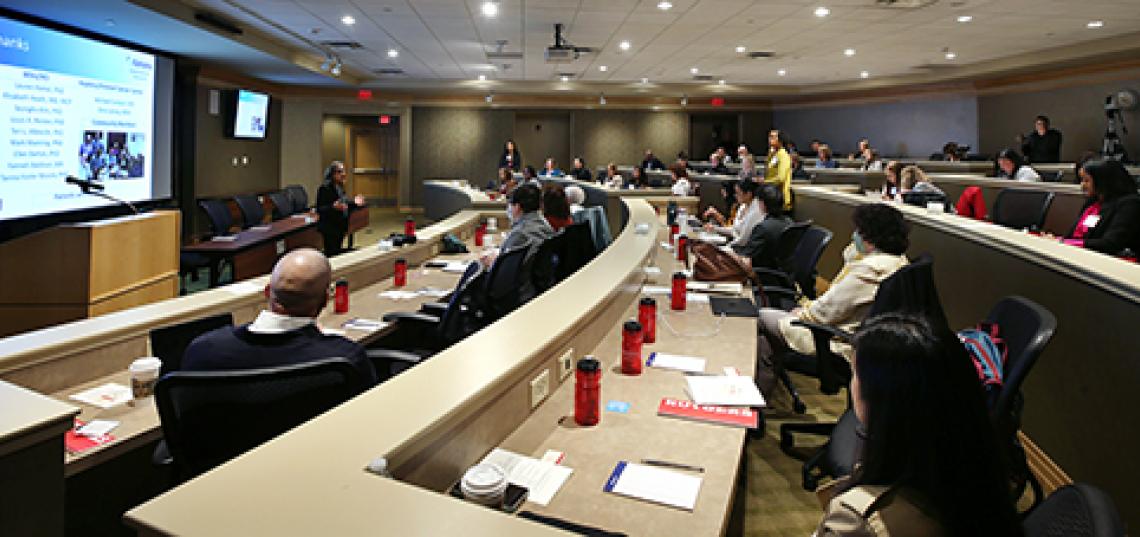
Fostering connections and cultivating collaboration among scholars and advocates was the aim of the inaugural “Symposium on Diversity, Equity, and Inclusion in Patient Engagement and Health Communication” held October 14, 2022 at the Heldrich Hotel in New Brunswick.
Hosted by SC&I and co-chaired by Associate Professor of Communication Maria Venetis, Ph.D.’10 and Assistant Professor of Communication Shawnika Hull, the Rutgers University symposium focused on inequities in cancer clinical trials, healthcare provider bias, research methods in patient-provider communication, and future directions in healthcare communication.
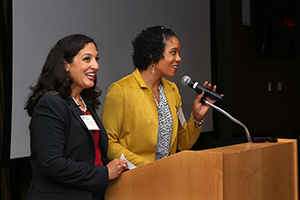 Additional symposium planning committee members from SC&I included Associate Professor of Communication Lisa Mikesell; Associate Professor of Library and Information Science Charles Senteio; Professor of Communication Itzhak Yanovitzky; and Ph.D. student Liesl Broadbridge.
Additional symposium planning committee members from SC&I included Associate Professor of Communication Lisa Mikesell; Associate Professor of Library and Information Science Charles Senteio; Professor of Communication Itzhak Yanovitzky; and Ph.D. student Liesl Broadbridge.
“It is important to have these conversations because we need to take seriously the fact that patient interactions with medical practitioners have material impacts on folk’s lives in profound ways,” said SC&I Assistant Dean for Diversity, Equity, and Inclusion Bernadette Gailliard. “To make overt the assumptions and biases that impede our communication is a great first step. Even as we work on changing attitudes and institutional structures, this symposium was important for highlighting clear communication behaviors that physicians can learn to better connect with their patients. That’s the kind of real-world impact we want our work to make in the world – me personally, and SC&I in general through the work of our faculty.”
The day-long event began with a welcome message from SC&I Interim Dean Dafna Lemish. Following were a keynote and a panel held during both the morning and afternoon sessions, with lunch in between. The day wrapped up with a poster session that provided participants and attendees an opportunity to network and share thoughts and ideas.
The Rutgers University symposium focused on inequities in cancer clinical trials, healthcare provider bias, research methods in patient-provider communication, and future directions in healthcare communication.
“We are so pleased with the outcome of the symposium,” Venetis said. “Our conference goals included cultivating conversation, networking, and sharing ideas. We wanted participation from across the university and community, and we achieved this aim. We had participants (and speakers) from the School of Communication and Information as well as the School of Public Health, School of Nursing, the Cancer Institute of New Jersey, Robert Wood Johnson Barnabas Health, Department of Plant Biology, and others.”
The morning keynote, “Addressing Inequities in Cancer Clinical Trial Participation,” was presented by Susan Eggly from the Karmanos Cancer Institute at Wayne State University. Nao Hagiwara of Virginia Commonwealth University presented the afternoon keynote, “The Role of Healthcare Providers’ Bias in Racial Healthcare Disparities: The Current Literature and Future Directions.”
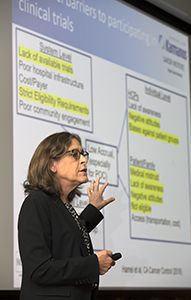 Two panels of experts also presented. The first, “Theory, Methods, and Metrics in Patient Provider Communication” included Rutgers University faculty members Matthew Matsaganis (SC&I); Tamara Nelson (Camden); Rafael Perez-Figueroa (Rutgers School of Public Health); and Laura Siminoff of Temple University.
Two panels of experts also presented. The first, “Theory, Methods, and Metrics in Patient Provider Communication” included Rutgers University faculty members Matthew Matsaganis (SC&I); Tamara Nelson (Camden); Rafael Perez-Figueroa (Rutgers School of Public Health); and Laura Siminoff of Temple University.
The second panel, held following the afternoon keynote, “Praxis, Interventions, and Future Directions for Dyadic Healthcare Communication” included SC&I Ph.D. alumna Joy Cox, author and collaborator on Presence 5 for Racial Justice; Denalee O’Malley (RWJ Medical School); Charles Senteio (SC&I), and Ralph Stowe, Citizen Scientist and founder and CEO of Jazz for Prostate Cancer Awareness.
Following the keynotes and panels, the poster session took place. (More information about the posters and authors can be found on the symposium website.)
Poster titles were:
- “Contextualizing Cancer (Mis)information Engagement & Dissemination Among Adult Latino/a Social Media Users.”
- “Gynecologic Cancer Treatment and Appointments: Healthcare Providers’ Assessment of the Role of Support Persons”
- “Drivers of Breast Cancer Disparities”
- “Teaching Health Professions Students to Create Therapeutic Relationships in Patient-Centered Care Using a Trauma-Informed Approach”
- “What are your Preferred Pronouns?”: Creating a More Inclusive Healthscape.”
- “DEI Initiatives at Clara Maas Medical Center”
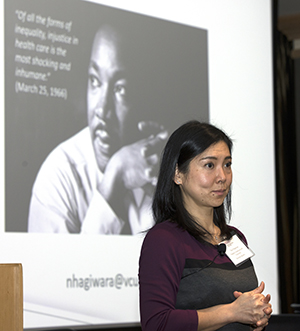 One of the most critical ideas discussed throughout the day, Venetis said, “isn't new, but it was great to have it reiterated. It is that to increase patient participation from diverse populations requires community-based work. Scholars cannot approach a group of patients and assume that patients want to share their experiences or participate in work. Patients are not wrong for being suspicious. Further, without getting to know the community in advance of the research, we are excluding important considerations that may be salient to that community.”
One of the most critical ideas discussed throughout the day, Venetis said, “isn't new, but it was great to have it reiterated. It is that to increase patient participation from diverse populations requires community-based work. Scholars cannot approach a group of patients and assume that patients want to share their experiences or participate in work. Patients are not wrong for being suspicious. Further, without getting to know the community in advance of the research, we are excluding important considerations that may be salient to that community.”
Matsaganis and Senteio said the conference has the potential to make a vital impact moving forward.
“There’s no doubt that communication is a powerful social determinant of health disparities and inequities,” Matsaganis said. “Focusing on patient-provider communication specifically allows us to illustrate in ways that most of us can relate to, often because we have been patients ourselves, the role of communication in exacerbating, but also in fighting health inequities that impact the lives of millions across the U.S. It’s critical for us to continue the conversations that we had at the symposium with colleagues across disciplines and with the diverse communities around the university. Doing so will ensure that our conceptual and methodological models for studying how identity, health, and communication are interrelated will grow more robust. Better research grounded in the everyday reality of the people impacted by health inequities will make for more powerful arguments leading to policy change and health justice.”
One of the most critical ideas discussed throughout the day, Venetis said, isn't new, but it was great to have it reiterated. It is that to increase patient participation from diverse populations requires community-based work.
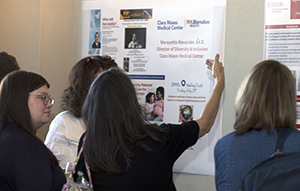 Senteio said, “This conference served as an important step towards developing innovative approaches to describe racial bias in patient-provider encounters and designing interventions to mitigate its negative effects. Doing so will help to improve patient care by serving to address a vital gap in the literature.”
Senteio said, “This conference served as an important step towards developing innovative approaches to describe racial bias in patient-provider encounters and designing interventions to mitigate its negative effects. Doing so will help to improve patient care by serving to address a vital gap in the literature.”
Looking ahead, Venetis and Hull said next steps include working on creating an outward-facing product for others such as a publication.
“Congratulations to Maria Venetis and Shawnika Hull for initiating, organizing, and leading an outstanding interdisciplinary symposium on DEI in patient engagement and healthcare communication," Lemish wrote in an email to the SC&I community following the event. “The symposium drew scholars and practitioners from several schools and institutes within and outside Rutgers, including from several additional universities. Outstanding keynotes and panels (including thought-provoking contributions by Matthew Matsaganis and Charles Senteio) stimulated very meaningful conversations about theory, methods, and social impact. Many SC&I faculty members and Ph.D. students attended actively. Kudos to Maria and Shawnika for such a high-quality, professional, and impactful event!”
To read the social media posted during the conference, see: #DEIPatientProviderCOM.
Discover more about the Rutgers School of Communication and Information on the website.
Photos:
Captions top to bottom: attendees listening to the first keynote; SC&I faculty members and symposium co-chairs Maria Venetis (l) and Shawnika Hull (r); Susan Eggly delivering the morning keynote; Nao Hagiwara presenting the afternoon keynote; the poster session.
Photo credit: Melvin Evans
